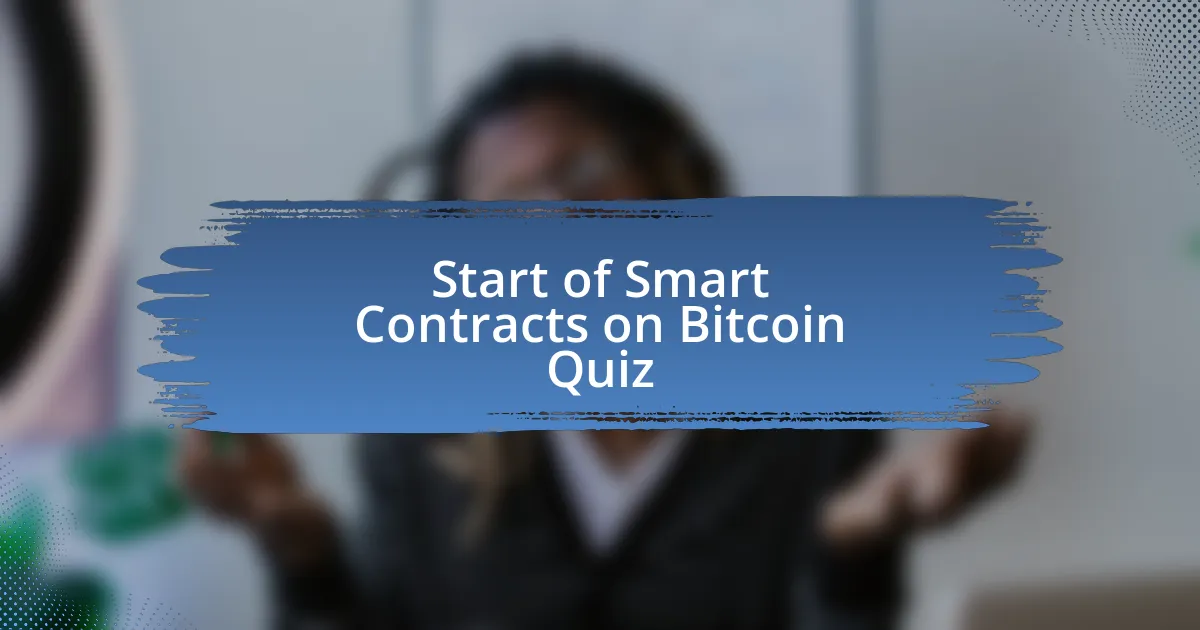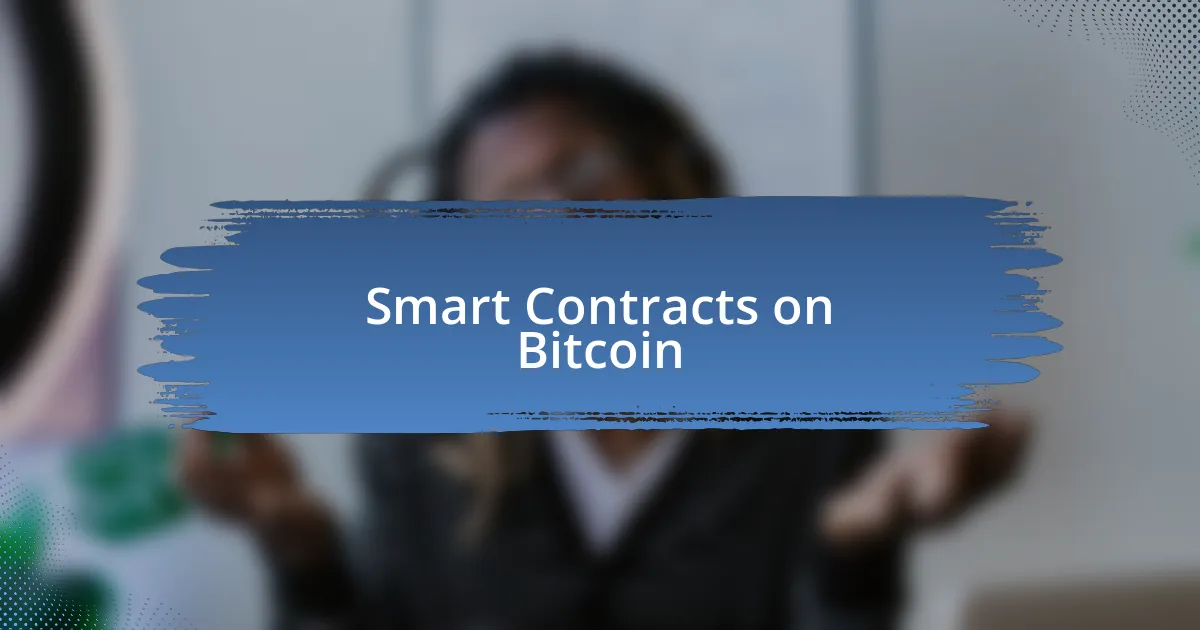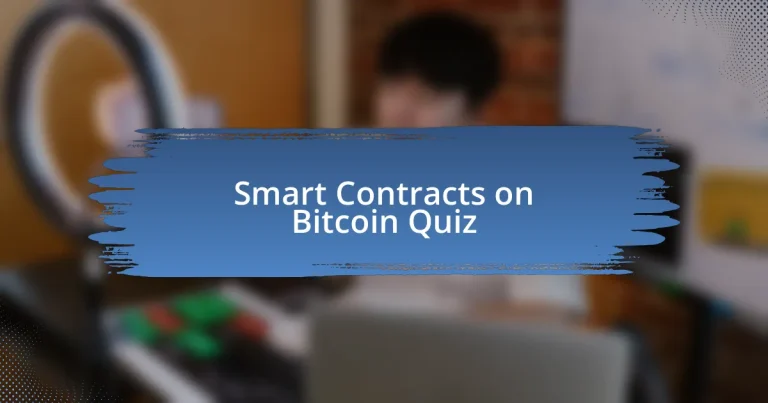
Start of Smart Contracts on Bitcoin Quiz
1. What is a Bitcoin smart contract?
- A Bitcoin smart contract is a type of cryptocurrency that operates independently of the blockchain.
- A Bitcoin smart contract is a digital agreement stored and executed across all nodes in the Bitcoin (BSV) Blockchain network.
- A Bitcoin smart contract is an informal agreement made through verbal communication.
- A Bitcoin smart contract is a physical document signed by all parties involved.
2. Who coined the term `Smart Contracts`?
- Vitalik Buterin
- Satoshi Nakamoto
- Hal Finney
- Nick Szabo
3. What is the purpose of Bitcoin smart contracts?
- Bitcoin smart contracts require manual oversight to function correctly.
- Bitcoin smart contracts are used to create virtual currencies and manage their values.
- Bitcoin smart contracts are solely for trading stocks and shares digitally.
- Bitcoin smart contracts facilitate, verify, or enforce the terms of an agreement without the need for a third party.
4. How are Bitcoin smart contracts stored and replicated?
- They are stored in a traditional database and require manual replication.
- Smart contracts are stored on a centralized server for easy access and updates.
- Each smart contract is replicated only on the creator`s node.
- The Bitcoin (BSV) ledger stores and replicates the agreement, giving it security and immutability.
5. What triggers the execution of a Bitcoin smart contract?
- The contract executes automatically without any external input.
- Some form of human interaction with a smart contract’s public key triggers the code.
- A random algorithm generates the execution time for the contract.
- The blockchain decides the execution based on user location data.
6. What are the key attributes of Bitcoin smart contracts?
- Key attributes include high speed, low cost, and user discretion.
- Key attributes include self-verifiability, self-executability, and tamper-proof nature.
- Key attributes include endless flexibility, manual execution, and privacy guarantees.
- Key attributes include comprehensive customization, reliance on third parties, and non-automated tasks.
7. How do Bitcoin smart contracts manage agreements between multiple parties?
- They manage agreements by defining and executing rule-based transactions.
- They require physical signatures to authenticate agreements.
- They rely on a central authority to verify all agreements.
- They use traditional legal frameworks to enforce contracts.
8. Can Bitcoin smart contracts process structured data from outside their environment?
- No, they only handle data within their internal environment.
- Yes, they can process structured data through privileged actors or Oracles.
- No, they require a third party to process any external data.
- Yes, but only if the data is unstructured.
9. What is the enforcement feature of Bitcoin smart contracts?
- They automatically distribute rewards to all miners within the network.
- They require a manual approval process by a trusted third party.
- They have features to freeze, thaw, and confiscate tokens, enabling effective token management.
- They are designed to operate exclusively on Layer 2 protocols.
10. How do Bitcoin smart contracts interact with other contracts?
- They are isolated and cannot share information with other contracts.
- They operate independently and do not affect other contracts.
- They require manual intervention to interact with other contracts.
- They can communicate with each other and influence the execution of one another.
11. What is the best way to visualize a smart contract?
- A vending machine automates usage leading to a specific result.
- A smartphone app displays interactive features and options.
- A simple webpage visually represents data input and output.
- A calculator processes numeric input for mathematical results.
12. What are the limitations of using smart contracts?
- Smart contracts have unlimited execution capabilities without constraints.
- Not every online agreement or action requires an unalterable protocol; traditional methods are often more practical.
- All smart contracts can easily be modified once deployed on the blockchain.
- Smart contracts are immune to bugs and errors in programming during execution.
13. What happens if a mistake is made in writing a smart contract?
- The mistake is ignored, and the contract continues to execute.
- The existing contract is automatically corrected by the blockchain.
- A new smart contract must be written to supersede the old one.
- The smart contract can be modified at any time without restrictions.
14. How do Bitcoin smart contracts handle tokenized assets?
- Users write code to create new tokenized assets on their local machine to enable transactions.
- Users transfer tokenized assets into a digital program that runs code to automatically validate specific conditions.
- Users copy tokenized assets into a centralized database where transactions are manually approved.
- Users exchange tokenized assets through private agreements with no automation involved.
15. What is the role of Script in Bitcoin smart contracts?
- Script is the storage system for Bitcoin transaction data.
- Script is the wallet application for managing Bitcoin.
- Script is the method for mining Bitcoin blocks.
- Script is the programming language used to write and deploy Bitcoin smart contracts.
16. Is Bitcoin`s Script Turing-complete?
- No, Bitcoin`s Script allows infinite loops.
- No, Bitcoin`s Script is not Turing-complete.
- Yes, Bitcoin`s Script is Turing-complete.
- Yes, Bitcoin`s Script can perform any computation.
17. What are the opcodes in Script?
- Script lacks opcodes that can read and write the current `state` of the blockchain, focusing on recording ownership and enabling coin transfers via UTXOs.
- Script employs opcodes that facilitate external communication with other blockchains.
- Script contains opcodes that allow for infinite loops and complex computation.
- Script uses a variety of opcodes to manipulate data directly on the blockchain.
18. How do Bitcoin smart contracts function in terms of `lock and key` system?
- The sender uses physical tokens as the `lock,` and the recipient must send real-world objects as the `key` to unlock the agreement.
- The sender establishes a condition or rule as the `lock,` and the recipient must provide a corresponding `key` in the form of code in Script to fulfill the sender`s condition.
- The sender embeds a digital signature as the `lock,` and the recipient must guess the correct password to serve as the `key.`
- The sender creates a permanent storage location called a `lock,` while the recipient writes a separate contract known as the `key` for access.
19. Can Bitcoin smart contracts interact with other blockchains?
- No, they can only operate within the Bitcoin blockchain itself.
- Yes, they can interact with tokenized versions of BTC that have been bridged.
- Yes, but only with Ethereum smart contracts.
- No, they can only function without external interactions.
20. What is the consensus mechanism used by Stacks for settling smart contract transactions on Bitcoin?
- Delegated Proof of Stake
- Proof of Stake
- Proof of Work
- Proof of Transfer
21. What is the power of Bitcoin smart contracts?
- The power relies on requiring human intervention to ensure accuracy and success.
- The power depends on the ability to modify transactions after they are created.
- The power lies in their ability to execute complex transactions autonomously without changing the history of Bitcoin itself.
- The power is based on the need for third-party verification to validate agreements.
22. How do Bitcoin smart contracts ensure trustless transactions?
- They ensure trustless transactions by manually verifying each transaction with bank statements.
- They ensure trustless transactions by requiring multiple human approvals before execution.
- They ensure trustless transactions by being autonomous pieces of logic that execute complex transactions without human intermediaries.
- They ensure trustless transactions by using a centralized server to manage all agreements.
23. What is the significance of Bitcoin smart contracts in the broader blockchain ecosystem?
- They serve only to issue new cryptocurrencies without any conditions.
- They rely solely on external databases for transaction validation.
- They are designed to create a completely anonymous environment for users.
- They leverage Bitcoin’s security and latent capital, making transactions more durable through Bitcoin’s battle-tested security.
24. Can Bitcoin smart contracts read and react to transactions occurring on the Bitcoin L1?
- Yes, they can read and react to transactions occurring on the Bitcoin L1.
- No, they are limited to off-chain data only.
- Yes, but only through external APIs.
- No, they cannot interact with Bitcoin transactions directly.
25. What is the role of Oracles in Bitcoin smart contracts?
- Oracles are responsible for creating Bitcoin tokens and managing their supply.
- Oracles operate the Bitcoin network by validating transactions and blocks.
- Oracles ensure that Bitcoin miners receive their rewards for validating transactions.
- Oracles are used to process structured data from outside the environment of the smart contract.
26. How do Bitcoin smart contracts handle data and processes across the Bitcoin network?
- They store all data locally on the creator`s device without sharing it.
- They manually require updates from users to function properly across the network.
- They only operate on a single server without any replication across the network.
- They affect data and processes at each node of the physically dispersed Bitcoin (BSV) Blockchain network, making them immutable.
27. What is the difference between Bitcoin smart contracts and standard computer programs?
- Standard computer programs are immutable and affect data across all networks.
- Standard computer programs have to be verified by a third party to execute.
- Bitcoin smart contracts are run on centralized servers storing all the data.
- Bitcoin smart contracts are immutable and affect data across the entire network.
28. Can Bitcoin smart contracts be upgraded?
- Yes, they can be upgraded through the Bitcoin Improvement Proposal (BIP) process.
- Yes, but only if all users agree to the changes.
- No, smart contracts can only be created, not modified.
- No, they are fixed and cannot be changed once deployed.
29. What are the different layers where Bitcoin smart contracts operate?
- Layers 1 and 2
- Layers 5 and 6
- Layers 3 and 4
- Layers 0 and 1
30. What is the relationship between Bitcoin smart contracts and the Bitcoin Improvement Proposal (BIP) process?
- The BIP process is used to standardize smart contracts without regard to Bitcoin`s capabilities.
- The BIP process is solely for governance decisions about Bitcoin mining rewards.
- The BIP process focuses on creating new cryptocurrencies unrelated to Bitcoin.
- The BIP process allows for the upgrade of commands and functions in Script, enhancing the programmability of Bitcoin smart contracts.

Congratulations! You’ve Completed the Quiz on Smart Contracts on Bitcoin
Thank you for participating in our quiz on Smart Contracts on Bitcoin. We hope you found the experience enjoyable and informative. Understanding how smart contracts operate within the Bitcoin network is crucial as blockchain technology continues to evolve. You have likely gained insights into their benefits, limitations, and potential applications in various sectors.
Through this quiz, you may have learned about the unique features of Bitcoin’s scripting language. You’ve also explored key concepts such as automation, trustlessness, and security in transactions. These elements are essential in grasping how smart contracts function and their implications for the digital economy. Each question was designed to enhance your knowledge and stimulate your curiosity.
We encourage you to deepen your understanding even further. Please check out the next section on this page dedicated to Smart Contracts on Bitcoin. This resource offers comprehensive information that will expand on what you learned in the quiz. Whether you’re a beginner or someone with more experience, there’s always something new to discover. Happy learning!

Smart Contracts on Bitcoin
Introduction to Smart Contracts
Smart contracts are self-executing agreements with the terms of the contract directly written into lines of code. They automate processes and transactions in a transparent and secure manner. Although most commonly associated with Ethereum, smart contracts can also be implemented on Bitcoin through specific mechanisms like Script and Bitcoin Improvement Proposals (BIPs) that enhance its scripting capabilities.
Bitcoin’s Scripting Language
Bitcoin utilizes a stack-based scripting language called Script. This language allows developers to create conditional statements, enabling simple smart contract functionality. The limitations of the script restrict complex operations compared to other blockchain platforms, but it still supports basic contracts through transaction conditions and security checks.
Types of Smart Contracts on Bitcoin
Smart contracts on Bitcoin can be categorized into various types, including multi-signature contracts and time-locked contracts. Multi-signature contracts require more than one signature to execute, enhancing security. Time-locked contracts prevent spending until a specified time, allowing users to create delayed payments and other time-sensitive agreements. These functionalities enable a range of applications from escrow to decentralized applications.
Examples of Smart Contracts on Bitcoin
Several projects have successfully implemented smart contracts on Bitcoin. One notable example is RSK (Rootstock), which is a smart contract platform that operates alongside Bitcoin but offers Ethereum-like capabilities. Another example is the use of the Lightning Network, which facilitates instant transactions and conditional payments through smart contract principles, enabling micropayments and scalable transactions.
Challenges and Limitations of Smart Contracts on Bitcoin
While smart contracts on Bitcoin show potential, they face challenges. Bitcoin’s limited scripting language restricts the complexity of contracts compared to platforms like Ethereum. Additionally, transaction fees can become prohibitive for executing frequent smart contract transactions. Security is also a concern, as code vulnerabilities can lead to exploits. These factors can hinder widespread adoption and functionality of smart contracts on the Bitcoin network.
What are Smart Contracts on Bitcoin?
Smart contracts on Bitcoin are self-executing contracts with the terms of the agreement directly written into code. They operate on blockchain technology, specifically using Bitcoin’s script language, though limited in functionality compared to platforms like Ethereum. Smart contracts enable automated transactions without the need for intermediaries, enhancing trust and efficiency in the process.
How do Smart Contracts on Bitcoin work?
Smart contracts on Bitcoin work by using the Bitcoin blockchain to store executable code that triggers actions based on predefined conditions. When conditions are met, the contract executes automatically, transferring assets or modifying states without human intervention. This process relies on the peer-to-peer network to validate transactions, ensuring security and decentralization.
Where can Smart Contracts on Bitcoin be utilized?
Smart contracts on Bitcoin can be utilized in various sectors, including finance, real estate, and supply chain management. They facilitate decentralized finance (DeFi) applications, enabling peer-to-peer lending and automated payments. Additionally, they can streamline property transactions, ensuring that ownership transfers occur only when both parties meet their contractual obligations.
When were Smart Contracts first introduced on Bitcoin?
Smart contracts were first introduced on Bitcoin with the implementation of Bitcoin’s scripting language in 2011. However, advancements in smart contract capabilities expanded significantly with the emergence of second-layer solutions like the Lightning Network in recent years, enabling more complex contracts and interactions.
Who is responsible for creating Smart Contracts on Bitcoin?
Developers and programmers are responsible for creating smart contracts on Bitcoin. They utilize the Bitcoin script language to write the contract code, ensuring it meets the desired conditions and functionality. Additionally, platforms and frameworks like RSK (Rootstock) enhance the development process by providing tools for building smart contracts on the Bitcoin network.


